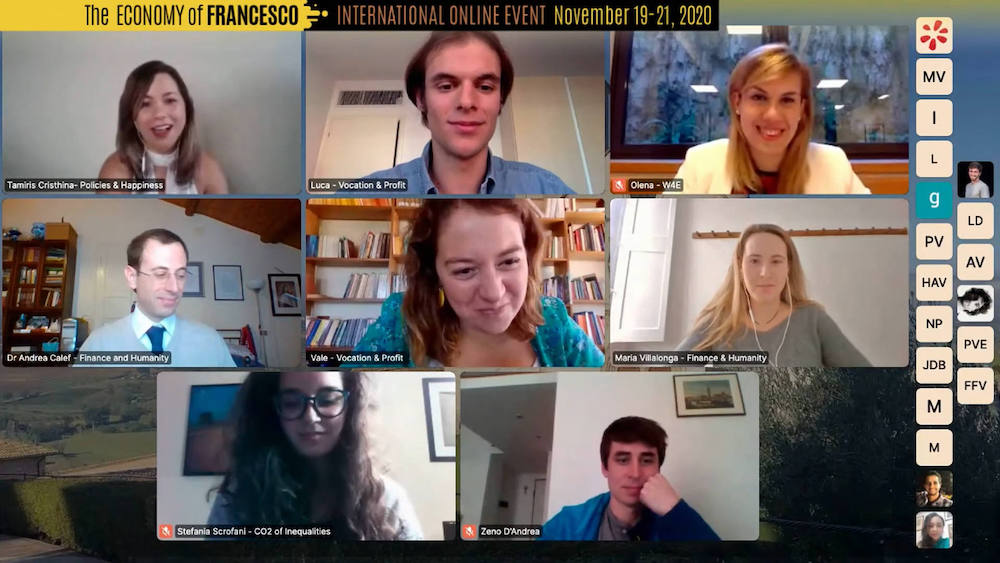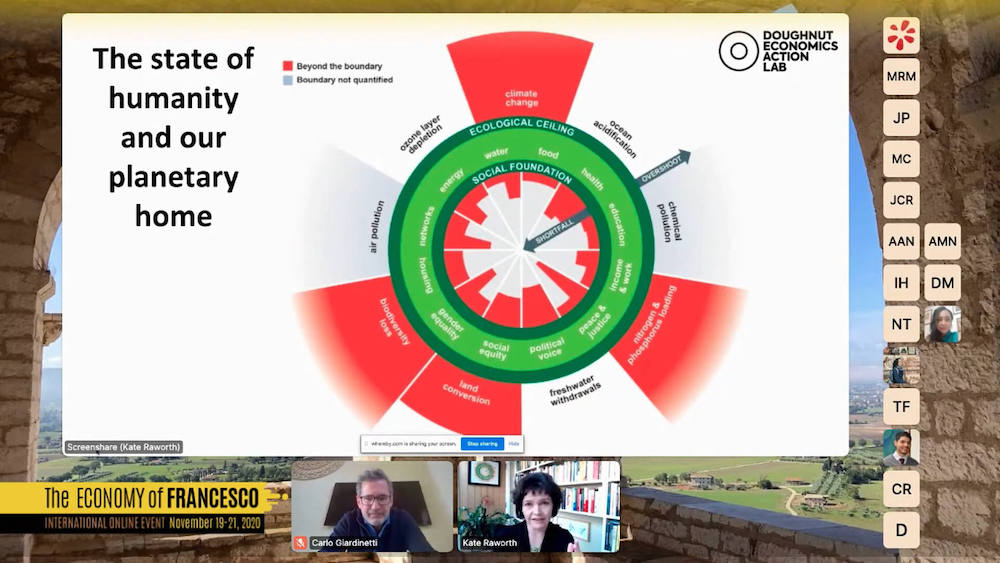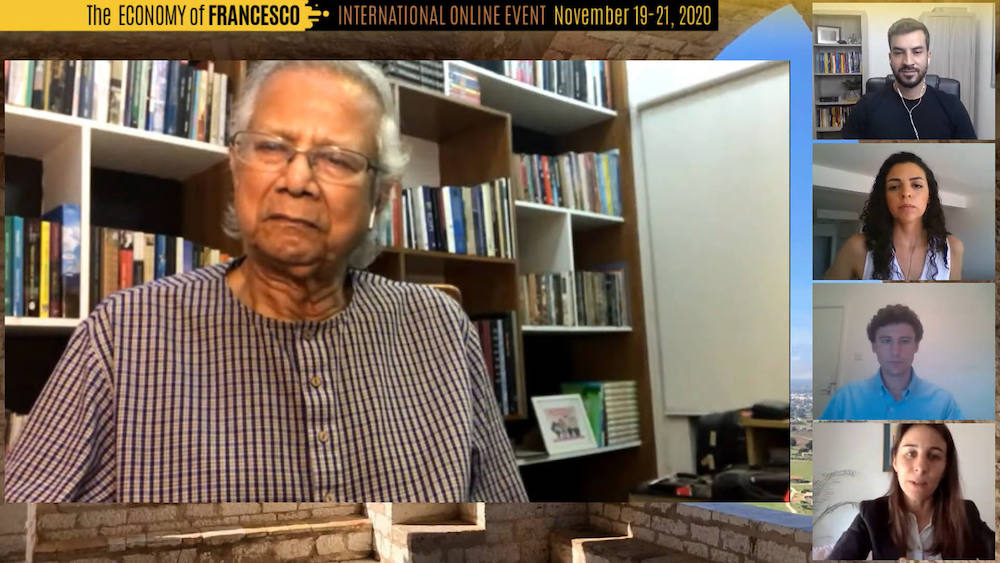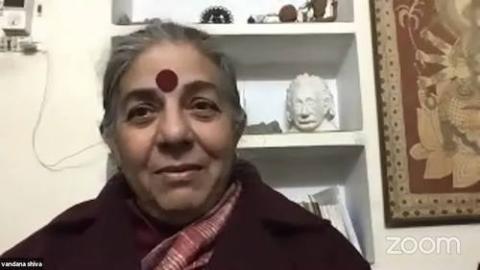People participate in the "Economy of Francesco" virtual meeting Nov. 21. Organizers were situated in the Basilica of St. Francis of Assisi in Assisi, Italy. (CNS/Economy of Francesco)
The Economy of Francesco ended its inaugural forum Saturday. But according to its participants, that end is just the beginning.
On the final day of the Economy of Francesco, Pope Francis encouraged participants to respond to "the urgent need for a different economic narrative," while the young adults attending laid out their own ideas for what that vision is, beginning with slowing down the global economic engines that are destroying the planet.
"We are convinced that a better world cannot be built without a better economy, and that the economy is so important for the lives of peoples and the poor that we all need to be concerned with it," read a statement from the young economists, entrepreneurs and "change makers" who participated in the three-day virtual gathering Nov. 19-21.
The Economy of Francesco sought to draw from the perspectives of young adults and their ideas for new economic models and ways for the world to define what human flourishing looks like.
Throughout the conference, anchored by a handful of organizers situated in the Basilica of St. Francis of Assisi in the saint's birthplace in Italy, speakers, participants and those conversing in the online chat expressed the belief that the current and past economic systems are not capable of addressing the dual challenges of meeting the needs of all people without further decimating the planet and its climate.
Advertisement
At its conclusion, the participants issued 12 points of action to guide a reanimation of the global economy. The 12 points mirror the 12 thematic village hubs that identified key topics, like finance and humanity, energy and poverty, and work and justice. At the top of the list: slow down economic pace globally "to let the Earth breathe."
"When COVID is over, we must choose to slow down the unbridled race that is suffocating the Earth and the weakest people who live on Earth," the young people said.
Other action points included:
- sharing advanced technologies to help low-income countries develop energy sources and economies in sustainable ways that don't contribute to global warming;
- placing stewardship of common goods, including the atmosphere and ecosystems, at the center of government and academic agendas;
- respecting the right to decent work for all;
- immediately abolishing tax havens worldwide;
- providing quality education and equal work opportunities for women;
- diverting resources away from war and toward education and healthcare.
Although some people may consider their requests "utopian," the participants said, they see their position as "prophetic, and therefore that we can ask, ask and ask again, because what seems impossible today will seem less so tomorrow thanks to our commitment and our insistence."
"We ask all this first of all from ourselves, and we are committed to living the best years of our energy and intelligence so that the [Economy of Francesco] can increasingly bring salt and leaven to everyone's economy," they wrote.

Young people take part in a virtual session during the Economy of Francesco on Nov. 21. The three-day forum brought together more than 2,000 economists and entrepreneurs under age 35 to reimagine a new economic model founded in the teachings of St. Francis of Assisi and Pope Francis. (NCR screenshot)
The Economy of Francesco conference was designed to be a collaborative catalyst to imagine a new economic system, one that benefits and prioritizes people, the poor and the planet. It has been called by some the "pope's Davos," a reference to the annual World Economic Forum of global leaders, but substituting the world's business elite with aspiring economists and entrepreneurs all under the age of 35.
In a video message Saturday, Francis was straightforward: "We need change, we want change and we seek change." He stressed "the urgent need for a different economic narrative" and urged young people who share his belief to "roll up your sleeves" and take the lead.
"The gravity of the present situation, made all the more evident by the COVID pandemic, demands that a responsible stand be taken by all social actors, all of us, with yourselves in the forefront," the pope said.
He continued, "The time has come to take up the challenge of promoting and encouraging models of development, progress and sustainability in which people, especially the excluded (including our sister Earth), will no longer be — at most — a merely nominal, technical or functional presence. Instead, they will become protagonists in their own lives and in the entire fabric of society."
People in Assisi, Italy, watch as Pope Francis speaks in a video message presented Nov. 21 during the "Economy of Francesco" virtual meeting. (CNS/Economy of Francesco)
Francis repeated the words of Pope Paul VI in saying development cannot be limited to economic growth but rather foster the whole of every person. He called the current system structurally imbalanced and said it was not enough to increase wealth and distribute it more fairly, trust in philanthropy to fill gaps or rely on new technology to make the Earth a better place for human life. Rather, there is a need "recover a sense of the common good," Francis said; the poor require more than social welfare but a seat at the table in developing new economic models that benefit all.
"No shortcuts! Be a leaven! Roll up your sleeves! Once the present health crisis has passed, the worst reaction would be to fall even more deeply into feverish consumerism and forms of selfish self-protection. Remember: We never emerge from a crisis unaffected; either we end up better or worse," he said.
An opportunity to change course
With the pope and the saint as inspiration, the Economy of Francesco assembled more than 2,000 young people to enter the conversation about what a new economy inspired by their teachings might look like. And while the coronavirus pandemic altered plans to meet in person in Assisi, it did little to dampen the attendees' conviction of the need for global economic change.
"You did not lose heart," Francis said, "and, in fact, I have appreciated the level of reflection, precision and seriousness with which you have worked. You brought to it all of your passion for the things that excite you, cause you concern, make you indignant and urge you to work for change."
Kate Raworth, an economist at the University of Oxford's Environmental Change Institute, said that the crises experienced in this early part of this century — the 2008 global recession, climate change, and the health and economic impacts of the coronavirus pandemic — illustrate how deeply interconnected the world is today and how current systems not only contributed to the crises, but cannot solve them because they weren't designed with these challenges in mind.
"We need to reimagine what human prosperity looks like in the 21st century, and a vision that doesn't depend on endless expansion everywhere," she said.

Kate Raworth, an economist at Oxford University's Environmental Change Institute, explains her "doughnut" economic model on advancing people's essential needs without exceeding the boundaries of the planet's resources. (NCR screenshot)
Raworth said her "doughnut model" of economics and social and planetary boundaries "is humanity's 21st-century selfie." But she said it can also be a "compass" for how economies must move forward.
The doughnut model illustrates two interrelated rings: an inner one that measures how nations are meeting people's essential needs, as defined by the United Nations Sustainable Development Goals; and an outer one that tracks how countries are exceeding life-supporting planetary boundaries related to climate, biodiversity, pollution and land use.
"The goal here is to meet the needs of all people within the means of the living planet. And suddenly humanity's aim isn't endless expansion — it's thriving in balance," she said.
The world as a whole and individual nations are currently far from balanced, Raworth added, with high-income countries like the U.S. still not meeting all citizens' essential needs while far putting a disproportionate strain on the planet's resources. The country closest to "the doughnut zone" is Vietnam.
Raworth said a central economic goal should be to create new business models that allow development to lift people from poverty, but not at the expense of environmental destruction.
"It's never been done. It's a new journey and it requires a new vision, new ambition and new policies," she said.
Muhammad Yunus, the Bangladeshi economist and 2006 Nobel Prize winner who launched a global microcredit movement, said that finance was originally created to facilitate trade, but it quickly transformed into a vehicle to consolidate wealth and "to make a few people richer and richer."
"The goal here is to meet the needs of all people within the means of the living planet. And suddenly humanity's aim isn't endless expansion — it's thriving in balance.
—Kate Raworth
In a conversation Friday with four young economists, Yunus said the coronavirus pandemic has exposed weaknesses in the current economic system, where those on the margins of society have fallen further into poverty — sometimes in a matter of weeks — while a "festival of super profit" takes place among companies making money from the pandemic-era stock market and vaccine production.
As nations look to piece their economies back together following the pandemic, Yunus said, returning to that state would be a mistake.
"I'm telling everybody, why do you want to go to a pre-pandemic situation? That was terrible. That world is absolutely pushing us into our ultimate death and ultimate disaster, because global warming will push us that way," he said.
Like others, including the pope and others inside the Vatican, he said the pandemic has "stopped the machine" and allowed an opportunity to examine whether humanity wants to change course. This is occurring at the start of a critical decade, during which global greenhouse gas emissions must be halved by 2030, and countries have collectively committed to achieving the U.N. Sustainable Development Goals.
Yunus pointed to a goal of "three zeroes": zero carbon emissions, zero wealth concentration, zero unemployment. Getting there will require building new pathways, he said, otherwise humanity will end up in the same destination.
"We have to make up our mind to make it happen. It's in our hands," Yunus said.

Bangladeshi economist and Nobel Prize winner Muhammed Yunus speaks with a group of young economists Nov. 20 during the Economy of Francesco virtual event. (NCR screenshot)
Economy, ecology, home
Vandana Shiva, an Indian physicist and environmental activist, in a discussion Friday said that while Aristotle considered economy as the art of living, it has now been distorted to mean moneymaking.
She went on to quote Pope Francis in his 2013 apostolic exhortation Evangelii Gaudium, where he said the golden calf has returned through the idolatry of money. Beyond that, progress has focused on "playing the role of God," Shiva said, whether in gene editing, genetically modified seeds or automation. The present crises facing the world, she added, are "rooted in the idea that nature is dead, people are raw materials to be used and exploited — they, too, are just inputs to the machine."

"I have realized that the best economic principle is what St. Francis gave us: It is only in giving that we receive," said Indian physicist and environmental activist Vandana Shiva during a discussion Nov. 20 during the Economy of Francesco. (NCR screenshot)
Noting that ecology and economy share a common root word, "home," she added that "the economy should take care of our common home" and seek to work in harmony with nature through work to restore and preserve it, rather than only extract resources from it.
"I have realized that the best economic principle is what St. Francis gave us: It is only in giving that we receive," she said.
Shiva called the present moment presents a chance to "reclaim our deep humanity" and oneness with one another and the Earth. "We are, of course, one species among trillions. And we are one humanity on one planet. And the Economy of Francesco shows the way," she said.
As for what happens next, committee members for the Economy of Francesco said the work will continue through the regional hubs as well as the "village" hubs arranged around the 12 topic areas of concern.
They also hope to hold another gathering in Assisi, this time in person, possibly in autumn 2021, and to include more people from Africa and South America, as well as people of low or no income.
In one Saturday segment, participants shared video messages of what the Economy of Francesco meant to them.
"Good music for our planet."
"The start of a new global economy that leaves nobody behind."
"Creating a culture of conservation, preservation and inclusion."
"The community who puts into practice Fratelli Tutti."
"A better world for our children."
One point where everyone agreed appeared on screen as the livestream neared its end: "This is just the beginning."
[Brian Roewe is NCR environment correspondent. His email address is broewe@ncronline.org. Follow him on Twitter: @BrianRoewe.]








